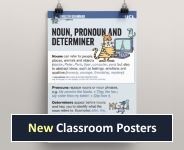Conjunctions
Conjunctions are words that link linguistic units such as words, phrases or clauses.
We distinguish coordinating conjunctions such as and, or and but from subordinating conjunctions such as because, since, when, while, etc.
Examples of coordinating conjunctions are:
- guitar and voice [S1A-045 #308]
- vehicles or people [W2B-013 #73]
In the examples above, the conjunctions join two nouns. Below, the conjunction joins two pronouns:
- you and her [S1A 031 #172]
Conjunctions can also join two adjectives:
- nice and quiet [S1A-019 #341]
We call the units that are joined by conjunctions conjoins.
In the examples below we have marked each conjoin with square brackets, and highlighted the conjunctions:
- The Secretary of [Trade] and [Industry] will act on the recommendation of the City panel. [S1B-011 #25]
- I mean I haven’t any data to compare the [speed] or [efficiency] of them or how much work it is to debug them. [S1A-029 #330]
- However, I hope you will understand if I suggest that we leave this until a little later in the year, say [April] or [May]. [W1B-019 #105]
- That decision in Strasbourg set in train a process of [urgent] but [careful] diplomacy. [S1B-054 #21]
- So there is a [brief] but [noticeable] gap in the sound. [W2B-038 #66]
So far, we have seen examples where just one word is joined to another, but conjunctions can also join longer units such as phrases and clauses.
In the examples below, the conjunctions join noun phrases:
- [Bay City Rollers] and [Ray Clemence’s legs] [S1A-046 #298]
- [The cafe] or [the bloke] [S1A-015 #253]
- [Not just a star conductor] but [a leading Gershwin scholar] [W2B-008 #164]
We can also link clauses which are equally important using a coordinating conjunction (and, or, but). Here are some examples:
- [Lucy write the story] and [Sam did the illustrations].
- Well, [it’s not exactly the Pope] but [I know what you mean], yes. [S1A-069 #329]
- [He noticed that his hands were no longer trembling], and [he smiled in contentment and relief]. [W2F-012 #30]
So far we have only looked at coordinating conjunctions. One of their main features is that they link units of similar kinds, which are equal parts of the whole.
However, when we link two or more clauses in a sentence sometimes one clause is more important, and another clause is dependent on it. We call the dependent clause a subordinate clause. Subordinate clauses are typically introduced by a subordinating conjunction such as after, as, because, before, (as) if, (even) if, in order that, until, (al)though, since, (so) that, unless, when, whereas, whether, while. This makes a different kind of link between units.
In the examples below, the subordinate clauses (in square brackets) supply additional information about ‘why’ or ‘when’ something happened. They have the grammatical function of Adverbial:
- We came to the town [because we couldn’t stay in our village]. [W2C-002 #83]
- I put Emily back in her own bed [after she’d fallen asleep]. [W1B-006 #13]
- Gorbachev apparently lived in a three storey house near the Kremlin in the Lenin Hills [when he first came to power]. [S2B-021 #53]
- [Before pencils were invented], thin rods of silver, zinc or lead were used for drawing. [W2D-016 #5]
Subordinate clauses can also function as Object of a verb, introduced by e.g. that or if:
Clauses that start with subordinating conjunctions can also be placed at the start of a sentence. For example, we can say:
- He helped them, [although they were ungrateful].
or
- [Although they were ungrateful, he helped them].
In contrast, clauses which follow coordinating conjunctions cannot normally be moved to the start of a sentence:
- He helped them, but they were ungrateful.
but not:
- *But they were ungrateful, he helped them.
Be careful: some subordinating conjunctions can also be used as prepositions.
For more information on conjunctions and clauses, see the CPD pages on clauses.
Welcome!

Englicious is totally free for everyone to use!
But in exchange, we ask that you register for an account on our site.
If you’ve already registered, you can log in straight away.
Since this is your first visit today, you can see this page by clicking the button below.
- Printer-friendly version
- Log in to view or leave comments

